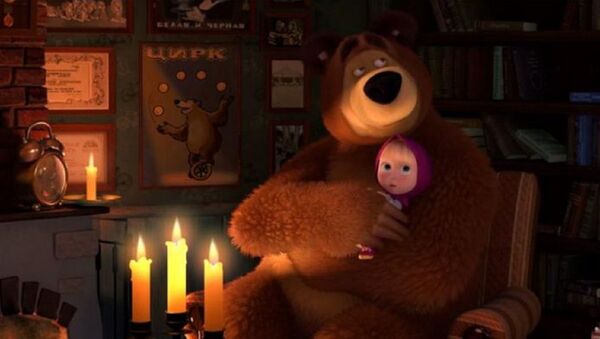The Russian Embassy in London has mocked British media reports on Kremlin propaganda in the well-known cartoon “Masha and the Bear.” The embassy took to Twitter and published a pointed comment on The Times’ recent op-ed accompanying it with a link to the edition’s social network page.
“How UK can find salvation from ‘Masha and the Bear’? Launch an Ant-Cartoon Excellence Centre somewhere in the Baltic? Place all cartoonists on EU sanction list? Clearly a decisive – and a very expensive – approach is needed!” the diplomats tweeted.
An important issue raised by @thetimes today: How UK can find salvation from “Masha and the Bear”? Launch an Ant-Cartoon Excellence Centre somewhere in the Baltic? Place all cartoonists on EU sanction list? Clearly a decisive – and a very expensive – approach is needed! pic.twitter.com/a05fKE24Be
— Russian Embassy, UK (@RussianEmbassy) 17 ноября 2018 г.
Twitter users naturally detected the irony in those words at once, with one even bringing up Belling Cat’s investigative attempts:
If you look closely Masha is giving hand signals to Russian overseas operatives. Shhh keep it a secret
— Bobstar (@bobstar_m) 17 ноября 2018 г.
Soon Bellingcat will find out in which military unit serve to Masha and the Bear.😅
— КIR II (@KIR_2_) 17 ноября 2018 г.
Another appeared to have treated The Times’ article as “a good advert,” adding that her greatgrandchildren share her “absolute delight to watch it.”
The article in the Times is the best advertisement. Now tens of millions of people from all over the world will watch this cartoon, they will surely like it and the number of fans will grow)
— Ta_u_nT (@Ta_u_nT) 18 ноября 2018 г.
Responding to one user’s question on the reasons for the cartoon bear’s tremendous popularity, another butted in: “Coz…coz…Putin,” thereby referring to common Western-devised rhetoric that the Russian president is to blame for whatever happens.
Forgive me, i don't know what you're on about😀
— Redman 🇬🇧 (@mport343) 17 ноября 2018 г.
I was mocking the above headline by putting the blame for the bears popularity on Putin, he gets the blame for almost everything else!😀
Many voiced a shared point of view that envy is the root cause…
They blame Vladimir Putin because they envy him. They will never get close to his shadow.
— Rietie Werth 🇿🇦 (@RietieW) 17 ноября 2018 г.
Because people love this cartoon, it is simple and kind,and therefore brilliant.Envy, what else?
— Elen))) (@LenochkaElen) 17 ноября 2018 г.
with one quipping that the ”foolish” Times’ mission had gone awry.
The mission of thetimes is failed. They showed their foolishness.
— щука ФСО (@shchukaFSO) 17 ноября 2018 г.
Another chimed in enthusiastically asking for more “Russian propaganda” to be aired:
Could we have more of this Russian propaganda please. my daughter's love it #autism #autismparents and the end of season 2 made my Father-in-Law cry.
— Daniel Whelan (@bigglesfarm) 17 ноября 2018 г.
A Russian speaker took to Twitter asking meanwhile:
“Soooo, kids’ cartoons are already undermining the economy and policies of the Great state of Britain?”
Уже детские мультики подрывают экономику и политику великой Британии!?!?
— Авто-джин (@raddjin72) 17 ноября 2018 г.
Another also sent jabs at the British edition’s “research efforts”:
https://t.co/wDtBR74fvN
— поехали (@Migo_and_WD) 18 ноября 2018 г.
For example, I feel a huge black propaganda against western culture in this video, haha! I think British universities should do research on that. Let @thetimes spend their free time writing articles on such nonsenses.😎
Кстати, Маша, ты — замечательный!
Remarks of admiration literally flooded the comment section:
I always watch Masha & The Bear with my nephew, he is very happy watching this cartoon. I don't know what have those people in their heads, saying a such of thing about a cartoon, I think they have 💩💩instead of a brain.
— Jhonny Gonzalez (@Jhonny_G_) 18 ноября 2018 г.
The creators of the animated series, which is now wildly popular abroad, stated earlier that they view The Times’ expert’s parallels between the series’ main character and Putin with humour and a deal of irony.
"It’s seriously difficult to comment on it, only with a great deal of irony. The Times would have been better off writing that Masha behaves like [former UK Prime Minister Winston] Churchill," the head of the cartoon's production studio Animaccord, Dmitry Loveyko, told Sputnik on Saturday.
Earlier in the week, UK-based newspaper The Times published an article calling the series the Kremlin's "soft propaganda" tool and pointed to similarities between Masha and the personality of Russian President Vladimir Putin. The publication quoted Professor Anthony Glees of the University of Buckingham characterizing Masha as "feisty, even rather nasty, but also plucky." According to the professor, she "punches above her slight weight," and it is "not far-fetched to see her as Putinesque."
There were also reports on Lithuanian lawmakers striving to ban the animated series from state telivision due to similar concerns over the cartoon's "propaganda nature," with Masha allegedly symbolizing Russian agression.
Masha and the Bear Phenomenon
The animated series, filmed by the Russian studio Animaccord, has been translated into a staggering 25 languages and is aired in 100 countries, to the joy of millions of its loyal fans all over the world. The episode “Masha plus porridge” has even broken a record on YouTube having racked up about 2 billion views on the major video hosting site as of October 2018.
The streaming service Netflix has since billed the Russian production as a “Russian phenomenon,” with experts worldwide agreeing that the secret lies in the wide applicability of the narrative based on a Russian folktale tale about a girl called Masha and eternal issues raised in the story.


